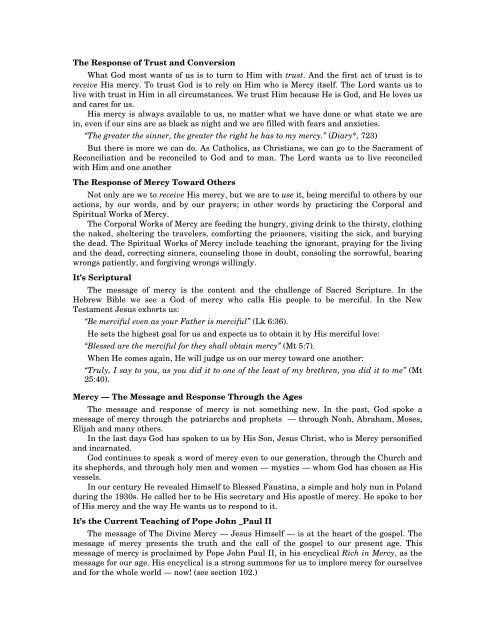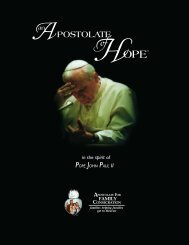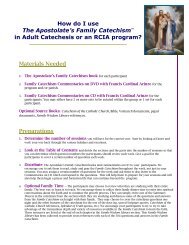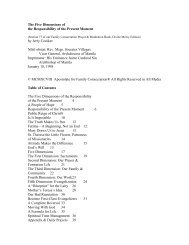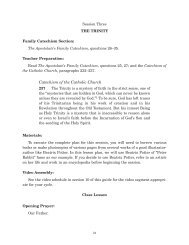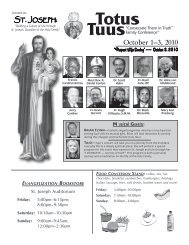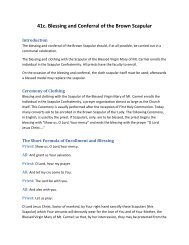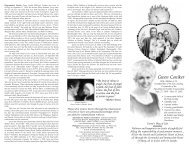20a. - 20k. Divine Mercy Section - Apostolate for Family Consecration
20a. - 20k. Divine Mercy Section - Apostolate for Family Consecration
20a. - 20k. Divine Mercy Section - Apostolate for Family Consecration
Create successful ePaper yourself
Turn your PDF publications into a flip-book with our unique Google optimized e-Paper software.
The Response of Trust and Conversion<br />
What God most wants of us is to turn to Him with trust. And the first act of trust is to<br />
receive His mercy. To trust God is to rely on Him who is <strong>Mercy</strong> itself. The Lord wants us to<br />
live with trust in Him in all circumstances. We trust Him because He is God, and He loves us<br />
and cares <strong>for</strong> us.<br />
His mercy is always available to us, no matter what we have done or what state we are<br />
in, even if our sins are as black as night and we are filled with fears and anxieties.<br />
“The greater the sinner, the greater the right he has to my mercy.” (Diary*, 723)<br />
But there is more we can do. As Catholics, as Christians, we can go to the Sacrament of<br />
Reconciliation and be reconciled to God and to man. The Lord wants us to live reconciled<br />
with Him and one another<br />
The Response of <strong>Mercy</strong> Toward Others<br />
Not only are we to receive His mercy, but we are to use it, being merciful to others by our<br />
actions, by our words, and by our prayers; in other words by practicing the Corporal and<br />
Spiritual Works of <strong>Mercy</strong>.<br />
The Corporal Works of <strong>Mercy</strong> are feeding the hungry, giving drink to the thirsty, clothing<br />
the naked, sheltering the travelers, com<strong>for</strong>ting the prisoners, visiting the sick, and burying<br />
the dead. The Spiritual Works of <strong>Mercy</strong> include teaching the ignorant, praying <strong>for</strong> the living<br />
and the dead, correcting sinners, counseling those in doubt, consoling the sorrowful, bearing<br />
wrongs patiently, and <strong>for</strong>giving wrongs willingly.<br />
It’s Scriptural<br />
The message of mercy is the content and the challenge of Sacred Scripture. In the<br />
Hebrew Bible we see a God of mercy who calls His people to be merciful. In the New<br />
Testament Jesus exhorts us:<br />
“Be merciful even as your Father is merciful” (Lk 6:36).<br />
He sets the highest goal <strong>for</strong> us and expects us to obtain it by His merciful love:<br />
“Blessed are the merciful <strong>for</strong> they shall obtain mercy” (Mt 5:7).<br />
When He comes again, He will judge us on our mercy toward one another:<br />
“Truly, I say to you, as you did it to one of the least of my brethren, you did it to me” (Mt<br />
25:40).<br />
<strong>Mercy</strong> — The Message and Response Through the Ages<br />
The message and response of mercy is not something new. In the past, God spoke a<br />
message of mercy through the patriarchs and prophets — through Noah, Abraham, Moses,<br />
Elijah and many others.<br />
In the last days God has spoken to us by His Son, Jesus Christ, who is <strong>Mercy</strong> personified<br />
and incarnated.<br />
God continues to speak a word of mercy even to our generation, through the Church and<br />
its shepherds, and through holy men and women — mystics — whom God has chosen as His<br />
vessels.<br />
In our century He revealed Himself to Blessed Faustina, a simple and holy nun in Poland<br />
during the 1930s. He called her to be His secretary and His apostle of mercy. He spoke to her<br />
of His mercy and the way He wants us to respond to it.<br />
It’s the Current Teaching of Pope John _Paul II<br />
The message of The <strong>Divine</strong> <strong>Mercy</strong> — Jesus Himself — is at the heart of the gospel. The<br />
message of mercy presents the truth and the call of the gospel to our present age. This<br />
message of mercy is proclaimed by Pope John Paul II, in his encyclical Rich in <strong>Mercy</strong>, as the<br />
message <strong>for</strong> our age. His encyclical is a strong summons <strong>for</strong> us to implore mercy <strong>for</strong> ourselves<br />
and <strong>for</strong> the whole world — now! (see section 102.)


